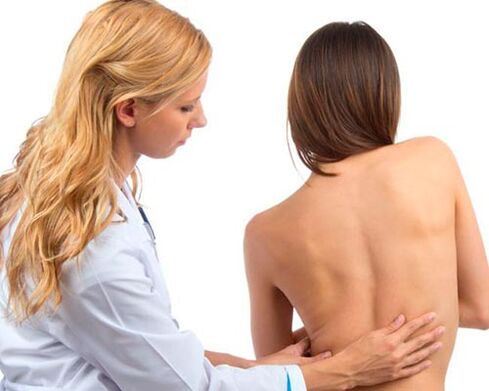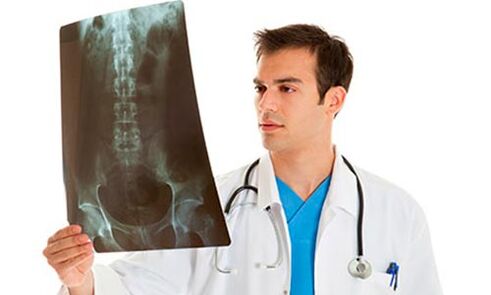Pain in the lower back is a companion of about a quarter of the country's population, it appears once, or becomes a common occurrence and accompanies a person throughout almost his entire life.Lower back pain often bothers men and women over 35-45 years old.
In recent years, due to physical inactivity, poor nutrition, excess weight, and constant stress, lower back pain syndrome is increasingly occurring in adolescents and children.Therefore, many people are increasingly concerned about the question of what to do if their lower back hurts.
Lower back pain
Pain in the spine in the lower back can be dull, aching, shooting, and there may also be girdling pain in the lower back.They can appear on the left or right side of the body, disappear without a trace or constantly return, worsening the quality of life and physical activity of a person.Patients complain that their lower back hurts a lot.It is important for the doctor to determine why the lower back hurts, and for the patient to receive quality treatment.

Causes of lower back pain
Sometimes severe lower back pain can be caused by excessive physical activity.Working in the country, overexertion in the gym, carrying heavy loads, and a sedentary lifestyle provoke the process when the lower back hurts.However, the pain usually disappears after a few days.But if relief does not occur, you should definitely consult a doctor to find out the causes of lower back pain.
Common reasons
Back pain in the lumbar region can have various causes.Pain can be caused by congenital diseases of the spinal column, malignant or benign tumors of the pelvic organs, and infectious processes.Doctors have a sufficient number of facts explaining why the back hurts in the lumbar region.The following causes of pain are identified:
- Acute or chronic spasm of the back muscles.
- Protrusions (bulging of the intervertebral disc) and herniated discs.
- Osteochondrosis (dystrophic damage to the joints or intervertebral discs), spondylosis (deformation, proliferation of bone tissue of the vertebrae), arthrosis (damage to the joints caused by metabolic disorders).
- Ankylosing spondylitis (a chronic disease leading to immobilization of the spinal column).
In men and women, the most common pathology is osteochondrosis, which causes curvature of the spinal column, compression of the spinal cord roots and severe pain in the lumbar spine.
One of the well-known syndromes is lumbago - a lumbago, in which the lower back or sacrum hurts very much.
In the lumbar region, the pain is often pulsating, tearing, lasts several minutes, but sometimes several hours or days, and disappears suddenly.
Dull, aching pain radiating under the ribs, associated with stretching of the renal capsule, is characteristic of kidney disease.This may be acute pyelonephritis (an inflammatory process that affects the tubular system of the kidneys) or blockage of the ureter with calculi (stones).
Nagging pain in the lower back develops with persistent allergic syndrome, hormonal imbalance, and tuberculosis.In this case, destruction of the vertebrae occurs.
Pain in the lower back, radiating to the right, can be symptoms of diseases of the pancreas, duodenum, stomach ulcers, aneurysm (dilation) of the abdominal aorta.With phlebitis (inflammation of the walls of venous vessels), proctitis (inflammation of the rectum), the lower back also hurts.Appendicitis or cholecystitis is characterized by pain that radiates to the right side of the lower back.
Shingles in the lumbar region can be caused by various types of herpes.Often the virus does not manifest itself as a rash, but rather as aches and pain.To find out what medications and how to treat the pain, you need to contact an infectious disease specialist to advise you on taking antiviral drugs.Girdle pain in the lower back also accompanies inflammation of the peritoneum, osteochondrosis, radiculitis and myositis.
In women
Lower back pain in women is caused by various reasons.The main ones are pregnancy, menopause, kidney diseases, digestive system disorders, osteochondrosis or hernia of the spinal column.Such pain in the lower back not only causes discomfort, but can also disrupt the monthly cycle and lead to infertility.
Nagging pain in the lower back occurs with gynecological problems.These may be inflammatory diseases of the female genital organs, endometriosis (pathological growth of the uterine epithelium), cysts on the ovaries, polyps, fibroids or other formations in the uterine cavity.
Only a specialist can determine what may cause a woman’s lower back pain.Therefore, you do not need to decide on your own what to do if your lower back hurts.First of all, you need to visit a gynecologist.
Often women have lower back pain during menstrual periods.The reasons are a temporary change in hormonal levels, an increase in the amount of estrogens that increase the sensitivity of the body, water retention, an increase in the load on the spinal column, and physiological contractions of the uterine walls.
Low back pain during pregnancy occurs in almost every woman, but often does not require treatment.Pain in the lumbar region is associated with an increase in the pregnant woman’s body weight and pressure on the spine, hormonal changes in the body, a slight shift in the center of gravity, and a weakening of the muscular-ligamentous system of the lower abdomen.
Sometimes women complain that their back hurts even after childbirth.Experts say that postpartum causes of lower back pain appear after microtraumas of the musculo-ligamentous apparatus and joints of the spine.
Spinal instability is another problem for women of any age, even those with mild obesity.Other common causes are damage to the intervertebral discs or joints.
Physical activity and prolonged standing in an upright position cause pain in the spine, pain in the lower back, difficulty straightening the body, and a desire to lie down and rest.Osteoporosis may develop during the postmenopausal period.
In men
The appearance of periodic back pain in men can be caused by professional activities associated with excessive physical activity, uncomfortable body postures, and work in the cold.The culprit of pain radiating to the lumbar region or groin may be epididymitis - inflammation of the testicles, manifested by swelling of the scrotum and fever.With prostatitis, inflammation of the bladder, a man is bothered by dull pain on the left side of the back.
Lower back pain in men over 40 years old is often caused by herniated intervertebral discs.Characterized by back pain when coughing, sneezing, difficulty bending and straightening the back.Pain in the lower back intensifies when standing upright, so such patients tend to lie down faster.An advanced hernia and pain in the lower back sometimes require surgery.
The listed specific male diseases and other pathologies in which the lower back hurts constantly and severely should not be treated without the supervision of a doctor.Self-medication can lead to aggravation and complication of the pathological process and result in disability.Treatment of the lumbar spine can only be performed by certified specialists.
Diagnosis of diseases
If the exact cause of the pain is not yet known, then diagnostic measures should begin with a visit to the therapist.Treatment of lower back pain should begin after an accurate diagnosis has been established, which is carried out after a complete examination.The examination includes:
- study of anamnesis (questioning the patient about the disease);
- visual inspection of painful points;
- blood and urine tests (general and biochemical);
- ultrasound examination (ultrasound);
- X-ray examination of the spine;
- magnetic resonance imaging (MRI);
- computed tomography (CT).
Since pain in the lumbar region is caused not only by neurological, but also by somatic causes, the patient should be examined by a neurologist, vertebrologist, therapist, and nephrologist.Women, if they have pain in the lower back, should definitely be examined by a gynecologist, and men should visit a urologist.
Treatment of lower back pain
After a correct diagnosis of lower back pain is made, the specialist prescribes treatment specific to this pathology, which is aimed at eliminating the causes of the disease.
If your back hurts, you should not look for the answer to the question of how to relieve lower back pain from your neighbors, acquaintances, or on the Internet.Lower back pain has different causes, so the treatment for each disease is individual.Only a doctor knows how to cure a patient and how to relieve pain.

Non-steroidal anti-inflammatory drugs are prescribed to relieve lower back pain.These medications have a negative effect on the gastric mucosa, so they must be taken simultaneously with medications that reduce acidity and protect the stomach walls from damage.For pain, you can use appropriate ointments or gels as prescribed by your doctor.
Since pain in the spine and lower back is caused by various reasons, only specialists can prescribe appropriate treatment for the lower back.Therefore, at the first opportunity you need to consult a doctor and not self-medicate.Only a doctor can determine why the lower back hurts and how to get rid of lower back pain.
At home, treatment for lower back pain can be carried out only after examination and medical examination, otherwise incurable complications may arise.
If your lower back hurts, then treatment can be complex, that is, you can use both traditional and folk methods.
Prevention
It is better to prevent pain in the spine, then you will not have to look for the answer to the question of how to treat lower back pain.The rules of prevention are simple but effective.The main thing is not to forget to fulfill them.
According to statistics, more than 25-30% of people have experienced this condition when their back hurts.Preventive planned monitoring of health status and timely consultation with a doctor allows you to identify incipient pathology, diagnose why the spine hurts in the lumbar region, why the lower back is pulled.
Morning exercises, jogging, brisk walks, gym classes, swimming are the main physical activities necessary for the muscles of the spine and back.At least 20-30 minutes a day, without strong tension or overload, will help strengthen muscle tissue.

To reduce the load on the spinal column, you need to adjust your body weight.Excess weight and physical inactivity are the enemies of the spinal column.
To properly reduce body weight, you should not get carried away with diets found on the Internet.It is better to consult a nutritionist or your doctor to receive competent recommendations on nutrition and maintaining water-salt balance.
Routine medical examinations are important to prevent back pain in the lumbar region.Women must visit a gynecologist every year, men - a urologist.Many spinal diseases begin in childhood.
Parents need to closely monitor the child’s health, teach him to exercise, active children’s games, and correct posture.School-age children must undergo a routine medical examination every year before the start of the school year.
If your lower back hurts, a positive attitude, faith in success, compliance with all the instructions of specialists makes it possible to reduce or completely get rid of pain and lead a full life.


















